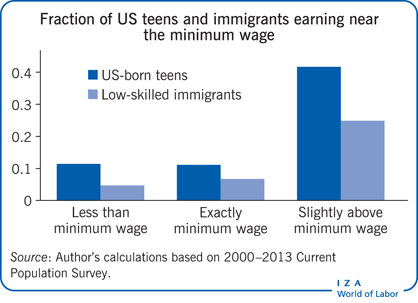Elevator pitch
According to economic theory, a minimum wage reduces the number of low-wage jobs and increases the number of available workers, allowing greater hiring selectivity. More competition for a smaller number of low-wage jobs will disadvantage immigrants if employers perceive them as less skilled than native-born workers—and vice versa. Studies indicate that a higher minimum wage does not hurt immigrants, but there is no consensus on whether immigrants benefit at the expense of natives. Studies also reach disparate conclusions on whether higher minimum wages attract or repel immigrants.

Key findings
Pros
Although most evidence suggests that a minimum wage reduces employment among low-skilled workers, there has been no evidence of an adverse effect on immigrants.
A higher minimum wage increases average hourly earnings among low-skilled workers who remain employed, including immigrants.
Data suggest that employment of low-skilled immigrants increases when the minimum wage rises.
Several studies conclude that immigrants move away from areas with higher minimum wages, reducing adverse effects on native-born workers.
Compliance with minimum wage laws does not appear to be lower for immigrants than for natives.
Cons
No studies outside of the US have examined the effect of the minimum wage on immigrants and natives.
Increased employment of low-skilled immigrants when the minimum wage rises may mean that employers substitute immigrants for native-born workers, to the detriment of natives.
Unauthorized immigrants appear more likely to be paid below the minimum wage than other workers.
Some evidence suggests that low-skilled immigrants are more likely to move to areas experiencing minimum wage increases, which could boost competition among immigrants and native-born workers at the same time that the number of jobs shrinks.